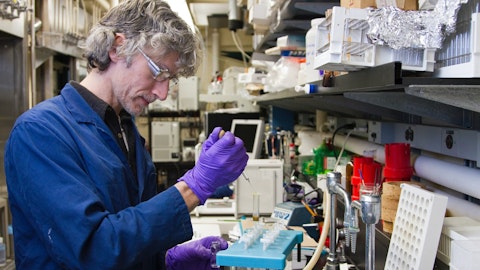Fergus Fleming: Yes, hi Jens. Interestingly, I think both of your questions are somewhat linked, and that while there is a lot of research going on in terms of how data and genetics can be used to generate insights into chronic kidney disease and other chronic conditions, they’re very much at a population level of screening and early risk prediction in undiagnosed patients, which is somewhat different to the spectrum in which we operate in. And it’s also largely based on discovery at discovery levels for sub phenotypes or subclasses of disease for pharmaceutical companies to target. So in the short-term we were not seeing anything that is commercially scalable and implementable at the clinical level. Interestingly, the prime CKD program really comes from the overlying context, underlying context and biomarkers, and the biological imprints that you get from circulating biomarkers are the most impactful way of understanding what’s happening in the presence of disease and in the presence of therapeutics targeting that disease.
An essential element of the prime CKD program is not just the basic research and data around those biomarkers, and how they can shine a light on therapeutic benefit and therapeutic effect, but our role in that program is very much how you bring those findings to the clinic and the translational aspect of that from a regulatory and business process perspective. So I think prime CKD really seeks to address some of the major challenges that exist in terms of bringing these novel therapies and novel insights to the clinic. In relation to moving on to how that impacts on the role of KidneyIntelX in Europe. There is something that we are currently exploring in terms of what’s the best model by which we will deploy at the KidneyIntelX platform in Europe in relation to the asset methods, the source of data and how to collect data in a fashion that meets all the requirements around GDPR, etc.
So it is something that we’re looking at. And again, prime CKD serves as a vehicle by which we can engage with regulators in some of those questions. Because that is another central tenant of the prime CKD broken. So I think we’re going to benefit greatly from having access to a stakeholder group, having access to the leading clinical and scientific researchers in the field, and really understanding the challenges of translating this type of precision diagnostic solution in Europe.
Jens Lindqvist: Okay, that’s great. That’s very informative. Thank you.
Operator: . Our next question comes from Randy Baron with Pinnacle. Your line is now open.
Randy Baron: Hi, guys. Good morning. Can you hear me?
James McCullough: Yes. Hey, Randy.
Randy Baron: Good morning. I have one question for James and one for O.J. James, it seems to me I mean, your comments on the FDA were very brilliant and positive. Has there been a I don’t know change in tone or outlook or are you more positive today about FDA than you were call it six months ago?
James McCullough: I am. I think we’ve done a significant amount of work. I have to caveat to say until you have FDA, you don’t have it. Just to be very clear. But we’ve done an enormous amount of work, we have superb, third party advisors, many of whom were ex-FDA. And as we have gotten deeper and deeper into what is a very complex process, we’re not going for a me too product. We’re not going for something light, we are going for a new classification, we are going for something that has a lot of implications for how you bring a risk assessment, a prognostic and advanced prognostic test, to the front end of a very large disease category. And this takes a lot of time, a huge amount of data. FDA has been very thorough in reviewing that data.


